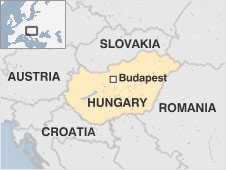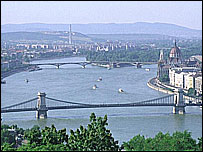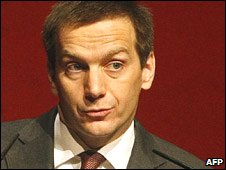Generic Medicines
Taj Pharma is the largest generic pharmaceutical company in India. We hold top positions in different established markets worldwide generics markets..
 |
It was admitted to Nato in 1999 and joined the EU in May 2004.
A landlocked country Hungary is home to Lake Balaton the largest in central Europe and to a large number of spa towns and hot springs.
It has rich traditions in folk and classical music and was the birthplace of numerous well loved performers and composers including Franz Liszt Bela Bartok and Zoltan Kodaly. It also has a long history of wine making.

Budapest the capital straddles the Danube river
|
Once part of the Ottoman and Hapsburg empires it became a partner in the Austro-Hungarian empire in the mid-19th century. After a period of turmoil following World War I an independent kingdom of Hungary was established.
The redrawing of European borders that took place after World War I left about five million ethnic Hungarians living in neighbouring countries. Their status remains a sensitive issue.
Following World War II the country found itself under communist rule. An uprising against Soviet domination in 1956 was crushed by Red Army forces but Hungary did later become the first Eastern European country to gain some economic freedom. It embraced aspects of the free market while still under communist rule and in 1968 the authorities allowed limited decentralisation of the economy.
Hungary played an important part in accelerating the collapse of communism across Eastern Europe when in 1989 it opened its border with Austria allowing thousands of East Germans to escape to the West. Just a few months later the Berlin Wall was history.
Hungary's post-communist economic transition was achieved relatively smoothly. Within four years of the collapse of communism nearly half of the country's economic enterprises had been transferred to the private sector and by 1998 Hungary was attracting nearly half of all foreign direct investment in its region.
Ten years later the picture looked rather less rosy. A high level of both private and state borrowing left the country particularly vulnerable to the credit crunch of 2008 and in October of that year the government was forced to appeal to international financial institutions such as the International Monetary Fund and the World Bank for massive loans in a bid to stave off economic collapse.
President: Laszlo Solyom
Prime minister: Gordon Bajnai
Gordon Bajnai became prime minister in April 2009 succeeding Ferenc Gyurcsany who resigned after failing to push through measures to revive Hungary's crisis-hit economy.

PM Gordon Bajnai was elected in the middle of a severe economic crisis
|
Mr Bajnai who had been economy minister in Mr Gyurcsany's government agreed to take over as PM until the next elections in 2019 on the condition that parliament pass stringent economic measures.
A businessman with a background in corporate management Mr Bajnai is a long-standing friend of Mr Gyurcsany who brought him into government in 2006 to head the national development agency. He became economy minister in 2008.
The new PM came into office faced with dauntingly low opinion poll ratings
and an unpopular ruling party in disarray.
Soon after taking over he announced an austerity programme designed to tackle the economic crisis including a two-year freeze on public sector wages and a $5bn cut in public spending.
Both Mr Bajnai and Mr Gyurcsany belong to the Socialist Party which has governed Hungary in partnership with the liberal Free Democrats since 2002.
In 2006 the coalition won a decisive election victory the first time a government had won consecutive terms since the restoration of democracy in 1990.
But the government's popularity was badly shaken when a tape recording surfaced of Prime Minister Gyurcsany admitting at a party meeting that the government had lied about the state of the economy during the election.
The comments sparked the first violent protests in the capital since the fall of communism. Mr Gyurcsany said he had been trying to convince his party about the urgent need for reform.
Born in 1968 in the town of Baja Gordon Bajnai studied at the University of Economics in Budapest.
He went on to build a career as a financial consultant for a time working at the same firm as his university friend Ferenc Gyurscany. His widely criticised role in the liquidation of the Hajdu-Bet poultry firm earned him the nickname "Goose Gordon" in Hungary's press.
Hungary's private broadcast media compete with state-run radio and TV. The state broadcaster has faced financial struggles dwindling audiences and allegations of political influence from government circles.
Public radio services operated by Hungarian Radio compete with many private national and local stations.
Hungary's national and local newspapers are privately-owned some of them by foreign groups and investors.
There were 5.2 million internet users by December 2008 (Internetworldstats).
The press
Television
Radio
News agencies
Havaria Press - private
AFRICA | ASIA-PACIFIC | AMERICAS | EUROPE | MIDDLEEAST | SOUTHASIA
![]()
![]()
![]()
Mauritania Mauritius Morocco Mozambique Namibia Niger Nigeria Republic-of-congo Rwanda Sao-tome-and-principe Senegal Seychelles Sierra-leone Somalia South-africa Sudan Swaziland Tanzania The-gambia Togo Tunisia Uganda Australia Brunei Burma Cambodia China East-timor Fiji Indonesia Japan Kazakhstan Kiribati Kyrgyzstan Laos Malaysia Marshall-islands Micronesia Mongolia Nauru New-zealand North-korea Palau Papua-new-guinea Samoa Singapore Solomon-islands South-korea Taiwan Tajikistan Thailand The-philippines Tonga Turkmenistan Tuvalu Uzbekistan Vanuatu Vietnam Antigua-and-barbuda Belize Bolivia Brazil Canada Chile Colombia Costa-rica Cuba Dominica Dominican-republic Ecuador El-salvador Grenada Guatemala Guyana Haiti Honduras Jamaica Mexico Nicaragua St-kitts-and-nevis St-lucia Suriname Trinidad-and-tobago Uruguay Venezuela Albania Andorra Armenia Austria Azerbaijan Belarus Belgium Bosnia-hercegovina Bulgaria Croatia Cyprus Czech-republic Denmark Estonia Finland France Georgia Germany Greece Hungary Iceland Ireland Italy Latvia Liechtenstein Lithuania Luxembourg Macedonia Malta Moldova Monaco Montenegro Norway Poland Portugal Russia San-marino Serbia Slovakia Slovenia Spain Sweden Algeria Egypt Iran Iraq Israel-and-palestinian-territories Jordan Kuwait Lebanon Libya Mauritania Oman Saudi-arabia Sudan Syria Tunisia United-arab-emirates Yemen Afghanistan Bangladesh Bhutan India Nepal Pakistan Sri-Lanka The-Maldive